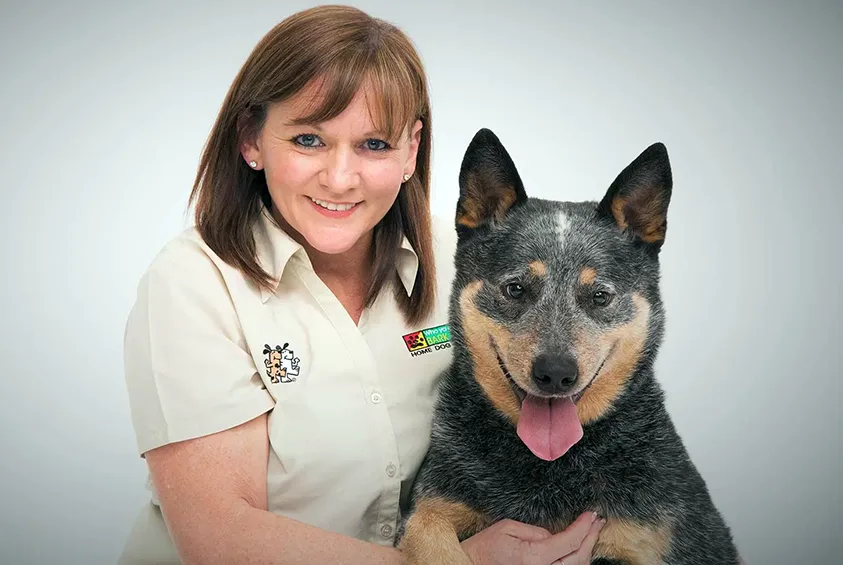The Border Collie continues to hold popularity with many dog lovers because of its intelligence. Border Collies make a great family dog, and have few aggression issues or other problems, providing they are kept entertained. This breed needs determined training to channel their energy in the right direction.
Border Collie Training
With any type of training that you wish to undertake, you need patience, commitment, direction and know-how.
Bark Busters believes that dogs are predisposed and hard-wired at birth, to want to belong to a social group, a pack, that has a strong leader at its core. It’s what makes them feel secure, safe, less anxious, knowing that their needs are going to be met.
There are several different types of training available, such as treat training or clicker training as well as other types that use force. Our Border Collie Training methods focus on clear communication and mutual respect rather than force or bribery.
Bark Busters training employs 'communication' using voice tone and body language. We speak to dogs in a way they understand, and they respond quickly. We train their brain and look for comprehension, cooperation and understanding from the dog, so they we know what we are requesting it to do. Border Collie Training in particular benefits from this approach, as these intelligent, high-energy dogs thrive on mental engagement and clear direction.
We believe that hands should only be used to pet a dog and that no dog should ever fear being touched by their owner's hands.
Treats might be one way to make the experience a pleasant one and might achieve that goal, but many dogs either come and take the treat and ignore you the rest of the time, or they are not motivated by treats. Either way, the treats have their limitations, and this type of training does not offer the complete answer for all dogs. Some doggie parents are sick and tired of carrying pockets full of treats to get their dog to comply with their wishes.
Ask yourself, would you prefer to be able to utter one word and have your dog stop in its tracks, return to you, and love you for who you are, not what treats you have in your pocket?
If the answer is yes, then Bark Busters training is the right method for you and your Border Collie. Effective Border Collie Training is about building trust and communication so that your dog listens because it respects you, not because it expects a treat.
Bark Busters training explains how to communicate with your dog in their language, since they can’t speak human. Our training is based on trust, respect and forming a strong bond between a dog and human. By using voice tones and body language, you will have a well-trained dog in no time. Most pet parents see amazing results after the first lesson. Our Border Collie Training programs are especially designed to harness the breed’s intelligence and energy in positive, productive ways.
Coming When Called
When we identify issues with recall, we tend to see cases where the dog owner has sent the wrong messages to their dog, such as only calling it by name. They generally demand that their dog return, using harsh voice tones, which frighten their dog, or they try to grab their dog's collar or tackle their dog out of frustration.
If you want your dog to come back to you when called, negative reinforcement will not work. Your dog must feel that it can approach you without fear or concern that it is in trouble when it does.
It is probably not the intention to scare the dog, but is an unforeseen consequence of harsh tones. Your dog may start to think its name is "bad dog".
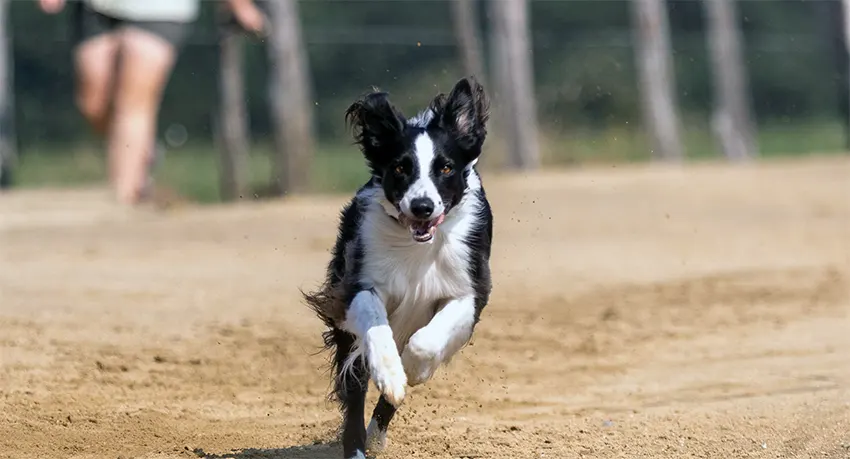
When calling your dog, it must first want to be with you, then it must want to stay with you. How you react when your dog approaches will depend on whether they want to stay and spend time or whether they want to go. It is very important to keep the invitation to approach appealing, in a high-pitched enticing voice, and lower your height. Don’t forget to offer lots of praise when they arrive.
Never grab their collar, or try to hold onto them, because this will cause your dog to try and avoid your hands.
Never chase your dog as this will only cause your dog to run away. It is better to run backwards, or lower your height, or even lie down. These simple yet powerful Border Collie Training techniques help build a stronger bond and ensure your dog comes when called, every time.
Border Collie Training Case Study
Aggression Towards Strangers
Millie, a rescue puppy, was about 6 months of age when Bark Busters was called in to address her unpredictable aggression towards strangers.
Millie would growl and snap if strangers approached or tried to touch her. This is quite common behaviour in temperaments such as the one that Millie has, which we diagnosed as 'fearful'.
Many puppies are born with a fearful or shy temperament that makes them predisposed to overacting when strangers approach or try to touch them.
We explained why Millie was showing this behaviour and that all dogs need strong leadership, especially a dog with Millie's temperament.
When dogs don't get the much-needed leadership and security that they crave, they become concerned for their own well-being, safety, and that of their family too. They start to take matters into their own hands and respond as a dog naturally does, with their teeth. This aggression can commence at about 6 to 12 months of age, and when it happens everyone who knows and loves them are caught by surprise.
It’s a self-protection response that is simply indicating to the approaching stranger that they should STOP their approach, or the consequences could be dire.
The reason that this 'aggression to strangers' generally starts somewhere beyond 6 months of age, is that young puppies won't generally deal with things, and they usually just practice avoidance until they feel capable of seriously repelling an approaching threat.
We started by providing her owners with specific techniques and a general obedience plan to start to gain control of Millie’s behaviour. We explained that she always needs to know that she can turn to them when she feels things don’t go her way or when she feels she needs protection. The owners needed to show her that "we have this" so she can quickly learn that her owners will take care of things that scare her.
We also had them change the way people interacted with her. They needed to be proactive, raise their hand in a STOP signal, and hand the approaching person a packet of treats. Visitors should then throw her a treat versus trying to pet her or stare directly into her eyes.
In no time at all Millie felt less concerned or worried about approaching strangers, knowing the humans had control, and she was in safe hands.
In the end, she began seeking people out more as they approached and waited for the treat she knew was coming.
History
Ever since man started rearing sheep, they needed a trusty dog to help protect stock and herd from them from pen to pen, for safe keeping. A dog's natural herding traits was carefully bred into the Border Collie's ancestors, which originated in the border regions between Scotland and the Northern parts of England.
Farmers would show off the prowess of their best sheep dogs to other farmers while at the markets and soon developed a reputation for having the best working dog litters. In the 19th Century, the original dogs that were outstanding at herding and guarding sheep or livestock, were further enhanced through breeding and natural selection.
In the late 1800’s, Queen Victoria saw one of the dogs at a show and became an enthusiast of the breed.
A gentleman by the name of R.J. Lloyd Price is one of the first people to organise sheepdog trials. In 1876, he brought around one hundred wild Welsh sheep to the Alexandra Palace in London for a sheep herding demonstration. The Livestock Journal described the astonishment of the spectators at the sharpness of the dogs, whose only assistance from their handlers was in the form of hand signals and whistles.
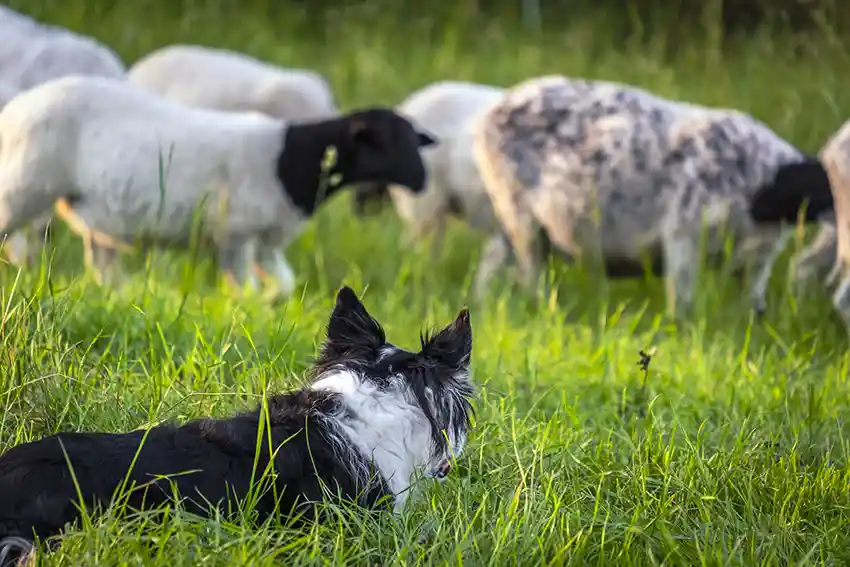
Management
If thinking about getting a Border Collie as your next dog, you need to give some thought to the time and exercise you can devote to such an energetic breed. It would be unfair to keep this breed couped up for long hours and they are definitely not a "couch potato". They do not like being left alone and they can exhibit separation anxiety too. If you lock them up for hours on end, it won’t be long until you get complaints from your neighbours about endless barking.
To establish yourself as a good leader you will need to provide a comfortable "time-out place" if you need to go to work or out for the evening.
Realistically you can’t spend 24/7 with your dog. For this reason, we recommend that you practice some good management of your Border Collie for those times when you are not able to keep them actively engaged. You will need to provide some kind of entertainment for them, something that keeps them busy and something that engages their brain. Pick an activity that does not over-excite them or visually stimulate them, such as a lure or a windup toy.
Never use laser beams or torches to entertain your dog. These types of activities over-stimulate the dog's senses and can leave lasting impression on them. It will be difficult to break these habits in later life and your dog will be chasing lights and shadows which can lead to stress and anxiety. See "games to play with your Border Collie", further on in this article.
If you have a busy lifestyle, then consider daycare or a dog walker. Always do your own research into the right people to care for your precious pet. Also check that they hold adequate insurance and have experience in dealing with this breed.
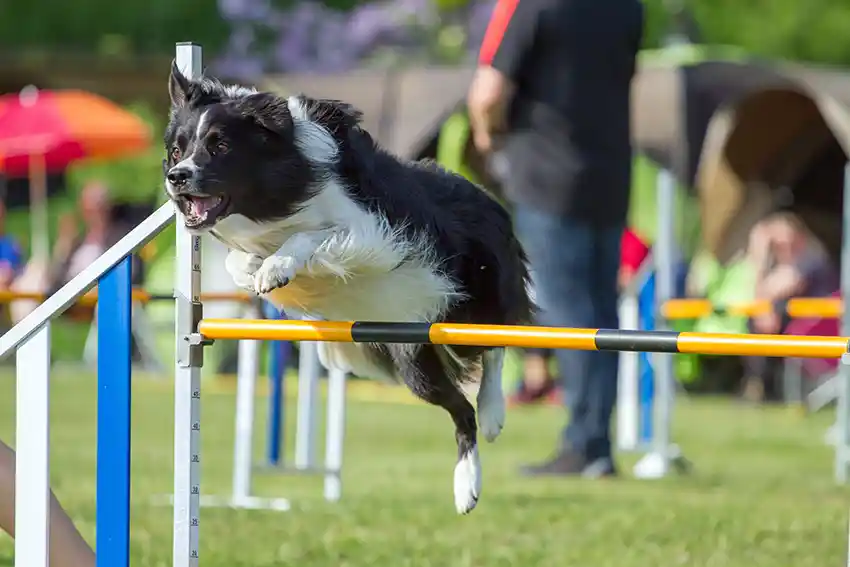
Popular Working and Sporting Dog
The keenness of the Border Collie and its attractive look and appeal is what made it a popular dog for obedience trials, dancing with dogs' competitions, and agility competitions. Once you see a Border Collie perform, you will be impressed.
They move gracefully with determination, focused on the task ahead which is a learned behaviour from their sheep dog herding ancestry. Once they lock their interest onto something, nothing else takes their focus.
Border Collies were bred for their stamina, always presenting their 'A game'. They ran all day, without exhaustion, as they accompanied the shepherds at a moment's notice.
Border Collies are easy to train but beware if they get bored as that is when mischief begins. Suddenly they will be barking, chasing cats, or digging. Make sure you have the time to devote to keeping their mind and body engaged. Their personality is characteristically alert, energetic, hardworking, and smart. They learn quickly, so quickly that it's sometimes difficult to keep them mentally challenged.
They are a visual breed who constantly scrutinises your face. They are highly sensitive to your moods and subtle looks, and will predict what you are about to do, even before you know what you are about to do yourself.
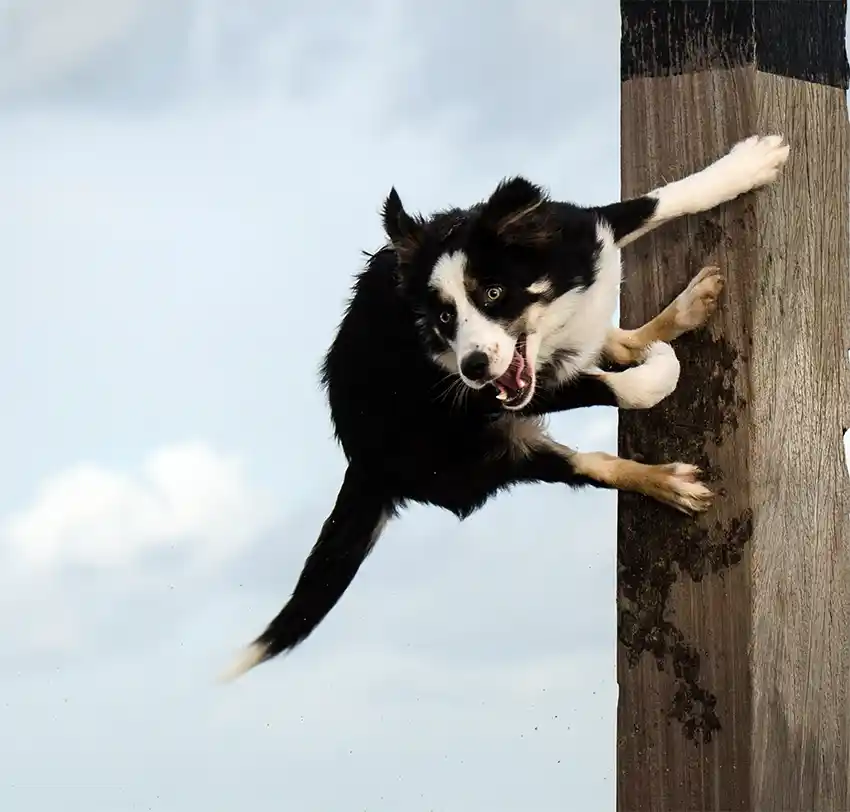
Personality and Temperament
The Border Collie is renowned as a fun-loving energetic breed with an outgoing personality that is constantly seeking gratification from activities. They love activities that are focused on running or chasing after things and often mix well with people and other dogs. If their energy is not pointed to something meaningful, their strong herding instinct can lead to chasing cars and small animals.
They generally have a very stable temperament, capable of fitting into most households. They can be trained to herd chickens, ducks, geese, and any livestock.
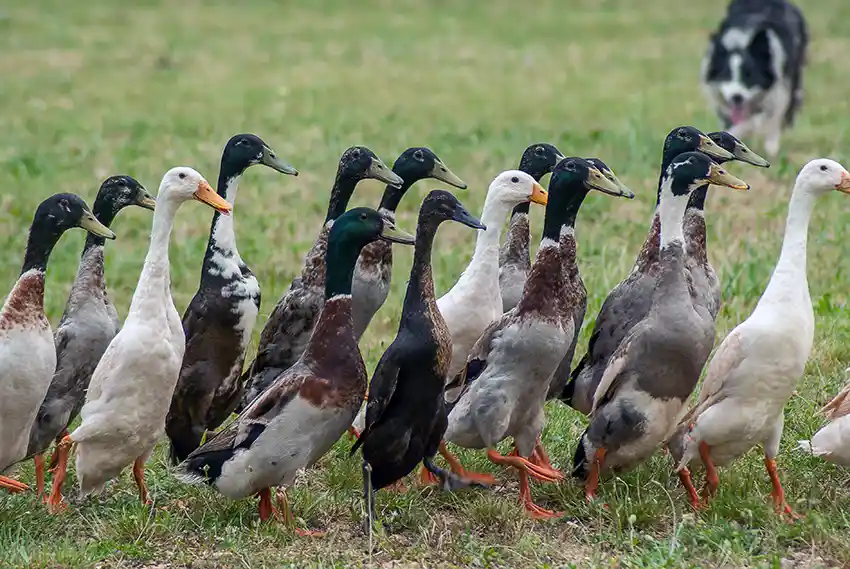
The Border Collie is a breed without too many issues. They generally have the perfect temperament / personality to be a safe family dog. This can of course be dependent on their temperament, upbringing, and positive exposure to things as they grow and mature.
The breed is not generally renowned for any guard dog abilities but will naturally bark at strangers or a perceived threat. They do need to be strictly controlled or they will bark at any kind of movement if their behaviour is not kept in check. See barking issues this article.
The right training for your Border Collie
It is important to be absolutely sure of the type of training you need for your Border Collie. These are a very trainable breed, but they do need understanding, patience, and some thought to the type of training that suits their intelligence. They need consistency and direction and some guidance in how to hold their focus. A highly intelligent dog breed, such as the Border Collie, needs to be doing something every single day.
Capabilities
This is a highly capable breed that likes nothing more than to be working at any task you set for it.
- A great dog for farm work of any kind
- An excellent frisbee catching breed
- Top dog for sheep and agility trials
- Excels at obedience competitions
- Brilliant breed for "Dancing Dogs Competitions"
- Excellent as a search and rescue dog
- A great family dog
- A good companion for jogging
Health
Everyday Illnesses and Injuries
Your Border Collie’s health concerns will change over the course of their life. A puppy might be more prone to eat something they shouldn't, a 2-year-old Border Collie may be more likely to show signs of separation anxiety, and a senior Border Collie is far more likely to develop arthritis as they age. Border Collies also have personality and physical traits that may make them more prone to certain conditions or situations. They are an incredibly intelligent breed, so a Border Collie without enough mental stimulation may become frustrated and more likely to show behaviour problems.
If you are ever concerned about your dog’s health, your local veterinarian is a great resource—no matter how small the question.
Genetic Health Concerns
The Border Collie is generally a healthy breed, but this doesn’t excuse them from genetic conditions like hip and joint dysplasia. Most reputable breeders now have their breeding stock checked and scored for these hereditary ailments by a vet. You can request proof that the puppy you are purchasing comes from parents that have been checked for these issues.
Many other health issues are also hereditary so you should do some research on the ancestry of your puppy and any health issues of that particular breed.
Many rescue organisations also check for common ailments before making them available for adoption.
Puppy Selection
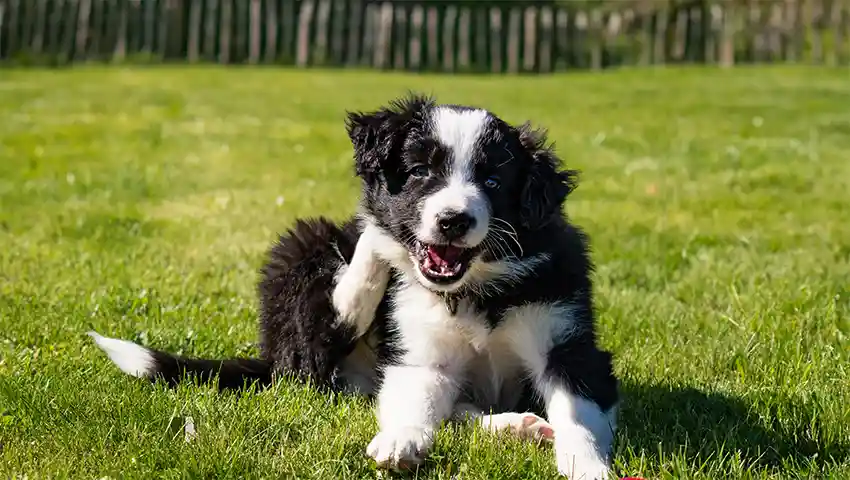
There are many places to acquire a puppy, but the right breeding and temperament are vitally important if you want a hassle-free dog.
First check out the local Breed Specific Rescues or animal welfare shelters such as RSPCA as they have many great dogs looking for homes, who for no fault of their own, have ended up at a rescue or animal shelter.
You won’t know their breeding, but these organisations test their dogs for temperament and soundness. You will also be doing a good deed by giving a needy dog or puppy a forever home.
When you are selecting a puppy, try to avoid selecting the fearful or over-zealous puppy. Also, if you are selecting from a rescue, consider that the dog might just be traumatised by their surroundings. Animal Welfare and Rescues do amazing work in trying to save dogs and match breeds to the right owners.
Many of our Bark Busters trainers volunteer their time and services at local shelters and rescues to assist in rehabilitating dogs.
Select the Puppy that Suits your Personality and Lifestyle
When selecting a Border Collie puppy, be sure to select the personality of puppy that suits your lifestyle. If you do choose to go to a breeder, then view both parents, to determine the puppies personality.
View the interaction of the pups as that will tell you a lot about their personality. Avoid the bullies or assertive types if you want a dog that is going to be good with children.
Four Basic Needs
Let's examine those four basic needs and why your dog needs them to keep it healthy, balanced and content.
Food - diet / nutrition
We promote a diet that is grain free, low in carbohydrates and without any harmful e-numbers, colours and preservatives. Carbohydrates do add energy that the dog needs to burn off and can make an already hyperactive dog more active.
The right diet, grain free and filled with fruits, vegetables and raw meat will have advantages to how your dog will feel, look and act.
If you want to understand why grains can make a dog more energetic, you only need to think of racehorses and how their trainers give them grain to get highly energetic racehorses. Energy in, equals energy out.
Bark Busters dog trainers are not vets or dietitians, so we urge you to do your own research into the best diet for your dog. A diet that you will be comfortable with.
We do however have vast experience of how highly concentrated grain diets effect behaviour and can cause hyperactivity. This is very prominent in Japan, where most dogs are fed high levels of rice in their diet which can adversely affect concentration and focus.
Safety - through leadership and education
All dogs need strong leadership and to know where they fit into the family unit. If they know they have a leader that will make all the decisions, one who is fair and just, they will be happy and content.
On the other hand, if they have no structure in their life, they have inconsistency, and don’t know how things will be from one day to the next, then they will become stressed and may experience health ailments, skin and stomach issues and behaviour problems. Routine and respect must be established. With equal doses of love and structure your dog will feel safe and secure.
Shelter - a place to call their own
Dogs love nothing better than to curl up on the couch or in a place they can call their own, even when there is more than one dog. Most dogs are very sociable, and they will think nothing of all snuggling in together. Provide your dog with its own "den", a place where they can call home, and somewhere they can go to for a bit of peace and quiet. Just make sure their "den" is warm, easy to clean and maintain.
Entertainment - toys and games
A very important part of your dog's four basic needs is their need to have something to do. If we want to avoid our pets becoming bored and destructive, then they need a way to fill their day.
Dogs thrive with physical and mental exercise. Dogs are highly intelligent animals, and they need to keep their brains active as much as their bodies. Entertainment is an important part of their well-being and essential to your dog's overall mental health.
One great toy is the Bark Busters GameChanger® which helps to prevent boredom, stress, and separation anxiety. By filling it with small treats, your dog will have plenty of fun trying to get the treats to dispense.
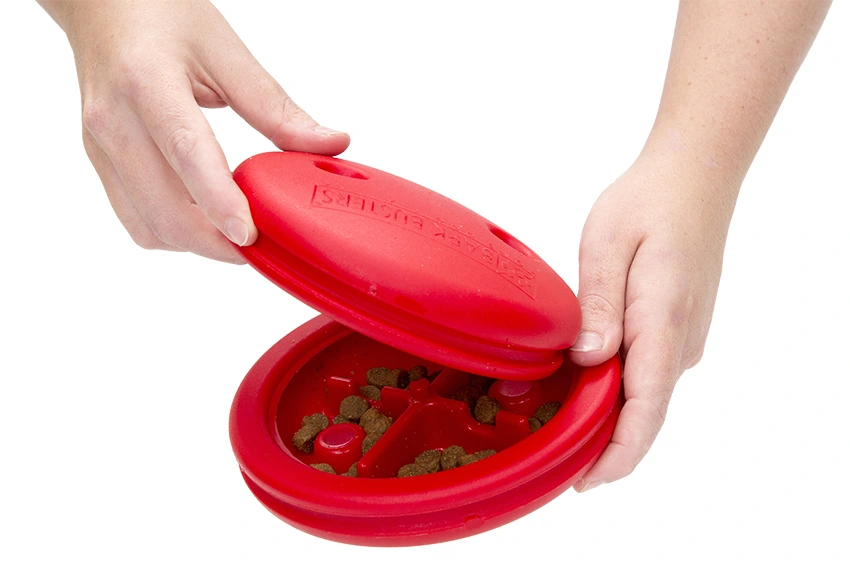
Games to Play
We have discussed the wrong kind of games to play with your Border Collie. So, what are the right games?
’Tug of War’ is okay, and playing ball is good, provided your dog is not the type that gets fixated on the ball and refuses to stop playing when requested. Hide and seek is a great game too. These are games where you hide things from your dog, toys or a tennis ball and then encourage them to find the items. You can increase the degree of difficulty as your dog gets better at the game.
Start out where your dog sees you hide the toy, then repeat over and over like 'Find or Seek'.
Remember to give a lot of praise when they find it. These type of games are more calming for your Border Collie, than those type of games that encourage your dog to become over-excited.
Child’s Play
Border Collies are great family dogs but they do need to be controlled around children or they might try to 'herd' them. They are highly intelligent and do learn quickly, so spend time educating them on what is good and what is not. If you are patient and understanding of their capabilities, you will be able to enjoy many great times, as a family, with your dog.
Interactive Toys
Bark Busters has the ultimate toy for all dogs that provides dogs with several options. The GameChanger® by Bark Busters is an interactive puzzle toy that delivers a treat. It's a chew toy, that they can carry around and take to their bed. They can't rip it apart like many other toys. It's a workout toy, that they flip over with their nose and scratch it with their paws. The GameChanger® will give your dog lots of fun and mental stimulation.
Agility and Flyball
Agility or flyball is a great game to play with your Border Collie. They were built for these games and throw their full effort into it. Agility keeps your dog focused and is a great way to reinforce your commands to your dog. They will listen out for your commands and direction which is also great in eveyday life and dangerous situations too. It is important that your dog listens to your commands if it gets into danger, and these games are great way to reinforce this.
Agility and flyball events are held up and down the country from local to county, to national championship levels. Not only is it enjoyable for your dog, but they are great events for all of the family too. It's ideal for the competitive person and those who just like a bit of fun too.
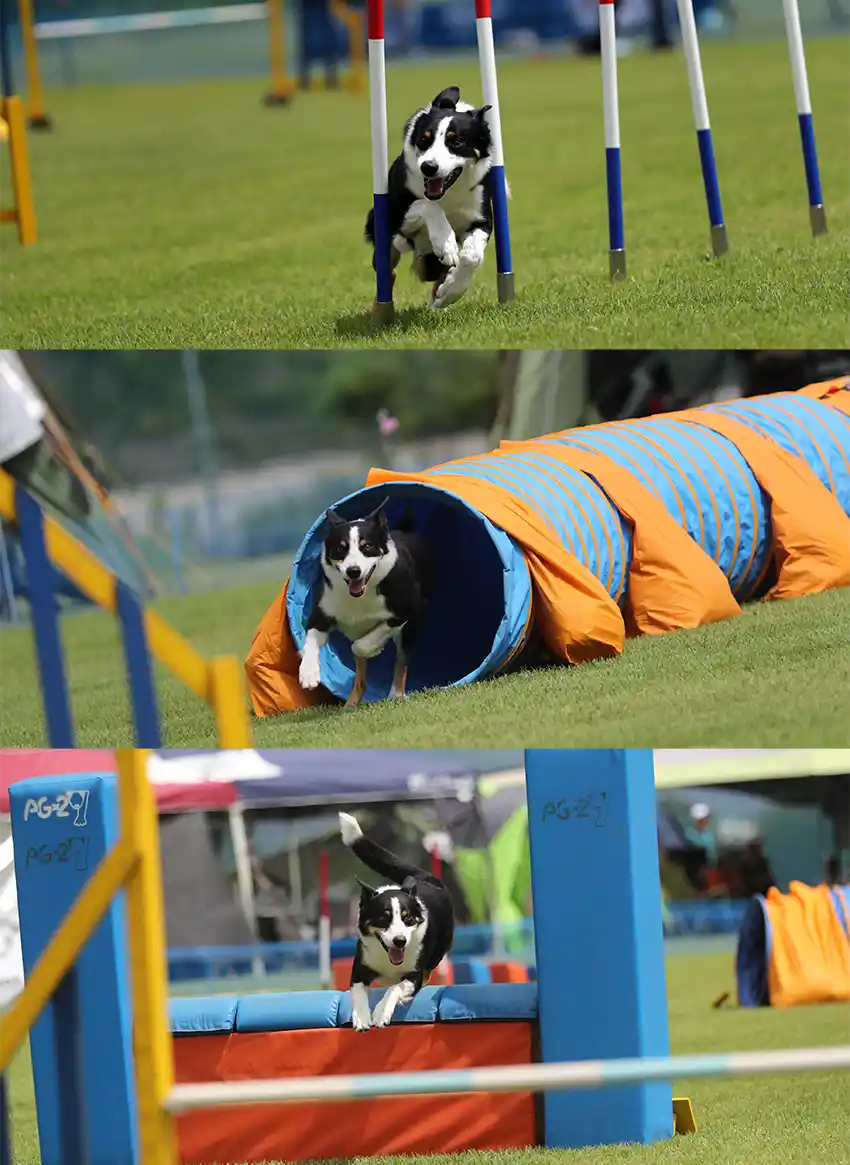
Dog Parks
With today's dog owners having such busy lifestyles, more and more dog owners are turning to dog parks as a way of socialising and exercising their dogs. While this is great fun for most dogs and dog owners, not every dog will do well in this environment.
Breeds like Border Collies are incredibly high energy and love to run and herd. While this sounds like a perfect match for a dog park, owners must pay close attention to how their dog directs its focus. If your dog is allowed to run wild and herd other dogs, your dog will likely have high levels of adrenaline. While adrenaline is helpful on a farm, if the dog becomes too focused on the wrong target in the dog park, this could quickly turn into a problem. If a dog doesn't enjoy being chased or nipped at the heels in this manner, they could feel threatened and become agitated. While the Border Collie is just doing what it lives to do, if the dog being chased feels threatened and turns on him, this could escalate into a fight. As the dogs have no prior relationship and are in a high stress environment, this can easily happen.
The best way to prevent this behaviour is to be sure you have strong voice control over your dog in low, medium and high level distraction environments before attempting to visit a dog park. Try visiting the dog park in off peak hours and practice gaining focus from your dog before you allow them to run off and play.
Bark Busters Lifetime Support Guarantee
Bark Busters dog behaviour therapists and trainers have trained more than 1 Million dogs worldwide and are renowned authorities in addressing dog behaviour with all-natural, dog-friendly methods. The Bark Busters training is the only service of its kind to provide International dog training guaranteed lifetime support. With hundreds of trainers around the world, Bark Busters continues its mission to enhance the human/canine relationship and to reduce the possibility of maltreatment, abandonment and euthanasia. Contact your local Bark Busters dog trainer to see how they can help.
This article is the copyright of Bark Busters® and is intended for information purposes only. Dog owners should fully research any problems that they may have with their dogs.

